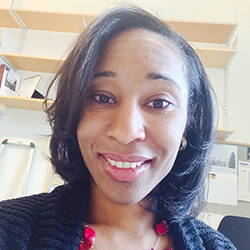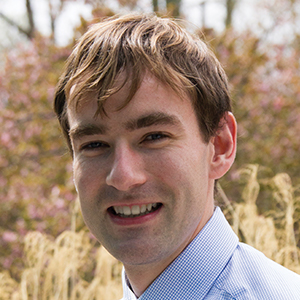Q&A with Lesley-Ann Giddings
Tell us about your current career position.
I am an assistant professor in the department of chemistry and biochemistry at Middlebury College in Middlebury, Vermont. Middlebury College is a small private liberal arts institution with approximately 2,500 undergraduates. I currently teach biochemistry, biochemistry laboratory and metabolism. I also dedicate my time to training talented undergraduates interested in biomedical research. My research currently focuses on exploiting and characterizing secondary metabolic biosynthetic pathways in microbes to identify new broad-spectrum antimicrobial agents.
 Lesley-Ann Giddings
Lesley-Ann Giddings
What are the key experiences and decisions you made that have helped you reach your current position?
Several key experiences have helped me along my journey to my current position. I wanted to become a teacher because I enjoyed tutoring students in science throughout high school and college. I enjoyed helping students improve in a subject in which they were struggling. While I was in graduate school at the Massachusetts Institute of Technology, I explored my interest in teaching science by taking teaching courses and workshops for those considering careers in academia. I also trained a number of undergraduates in the laboratory, which led me seriously to consider pursuing a career at a small undergraduate institution where I could teach and do research with students. As a Smith College alum, I knew the benefits of being taught in small class sizes and having one-on-one interactions with professors. During my postdoctoral training, I also taught at two liberal arts colleges to see if I would like working in an environment that valued teaching just as much as research. Even though striking a balance between teaching and doing research with students can be challenging, I really enjoyed my interactions with undergraduates and later decided to apply for academic jobs at small private liberal arts colleges.
How did you first become interested in science?
As a child, I loved watching the show “Ghostwriter” and reading mystery books, such as the Babysitters Club, Nancy Drew, the Hardy Boys, and the Boxcar Children. Initially I wanted to be a forensic scientist but later realized I would have to be very comfortable with working at crime scenes. In middle school, I developed a strong interest in science and realized that it was one way to understand life’s mysteries without having to be at the scene of a gruesome murder. As a result, I continued to excel in my science classes and enrolled in Science Skills Center High School in Brooklyn, NY, a high school dedicated to increasing the number of students from underrepresented ethnic groups in science, technology and mathematics.
Were there times when you failed at something you felt was critical to your path? If so, how did you regroup and get back on track?
Yes, there have been numerous occasions during which I failed at something, especially during graduate school. However, looking back on the times when my experiments failed, I learned how to accept that this was what science research was about: re-searching for the answer. I had to learn how to fail in order not to let my disappointment prevent me from moving forward with my science. I try to keep in mind the fact that if the problem were easy, it would have been solved already, and so I can’t give up. Every setback has been character building and helped me learn more about the problem as well as learn more about myself. I have to remind myself constantly not to compare my journey to those of others when things do not go my way. We all have the tendency to think the path to success is linear; however, the path to success has a lot of unintended detours that help us learn important life lessons. I always tell my students that life is all about how you bounce back from disappointment. Are you going to stay down or do something about it? I always push myself to move forward.
What advice would you give to young persons from underrepresented backgrounds who want to pursue a career in science similar to yours?
I think it is important for you to do some soul-searching and identify goals you would like to achieve in the near future as well as 5-10 years down the road. You need to think about what you are passionate about because you need to love what you do to survive the ups and downs in your career. I encourage you to learn to be comfortable with who you are, because a lot of people will try to talk you out of what you want to do in life, including yourself. Most times we don’t have the role models we need to make it in the careers we want. Self-doubt is probably the most harmful emotion that can talk you out of your dreams. I urge you to step out of your comfort zone and evaluate what you really have to lose. Oftentimes we realize that we would lose even more if we were not true to ourselves and did not pursue our dreams. Lastly, learn to be okay with failing. This is the hardest thing to learn; however, the faster you learn how to do this, the faster you will move in your research. Sometimes we get so disappointed with the outcome of an experiment that we are slow to make the next step, and we get in the way of our own success.
What are your hobbies?
My hobbies are traveling, relaxing with a good book, spending time with my family, going to the beach, playing Scrabble, and going to concerts and listening to music.
What was the last book you read?
The last book I read was “ David and Goliath” by Malcolm Gladwell. I love this book because it shows how the underdog can be successful once he fully recognizes his weaknesses and embraces his strengths.
Do you have any heroes, heroines or role models? If so, describe how they have influenced you.
I have been extremely lucky to meet so many people who have had positive impacts on my life. My family, teachers and friends have helped me realize my dream along the way by being supportive of my decisions and helping me find a way to achieve my goals when I thought they were impossible. I surround myself with people who troubleshoot my problems and present me with several solutions. They are my support network/cheerleaders who help me see the possible in the seemingly impossible.
What is it that keeps you working hard and studying science every day?
I love to train students to be critical, independent thinkers and use creative ways to problem solve. I find it extremely gratifying to teach someone a subject and have him or her turn around and show me an even better way of solving a problem in that area of research. I believe this is how educators help scientific ideas evolve, and I am so grateful to be a part of this process. Importantly, I work hard at my science not only to be an outstanding educator, but together with students, I get to solve mysteries in the laboratory, uncovering the truth about the world while learning something new along the way.
Enjoy reading ASBMB Today?
Become a member to receive the print edition four times a year and the digital edition monthly.
Learn moreGet the latest from ASBMB Today
Enter your email address, and we’ll send you a weekly email with recent articles, interviews and more.
Latest in People
People highlights or most popular articles

2026 ASBMB election results
Meet the new Council members and Nominating Committee member.

Simcox wins SACNAS mentorship award
She was recognized for her sustained excellence in mentorship and was honored at SACNAS’ 2025 National Conference.

From humble beginnings to unlocking lysosomal secrets
Monther Abu–Remaileh will receive the ASBMB’s 2026 Walter A. Shaw Young Investigator Award in Lipid Research at the ASBMB Annual Meeting, March 7-10 in Washington, D.C.

Chemistry meets biology to thwart parasites
Margaret Phillips will receive the Alice and C. C. Wang Award in Molecular Parasitology at the ASBMB Annual Meeting, March 7-10 in Washington, D.C.

ASBMB announces 2026 JBC/Tabor awardees
The seven awardees are first authors of outstanding papers published in 2025 in the Journal of Biological Chemistry.

Decoding how bacteria flip host’s molecular switches
Kim Orth will receive the Earl and Thressa Stadtman Distinguished Scientists Award at the ASBMB Annual Meeting, March 7–10, just outside of Washington, D.C.

